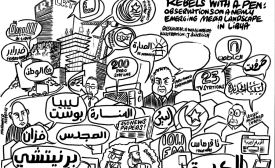alhurra
The much maligned Alhurra, the U.S. government's Arabic TV service, is now a "go-to" news channel in Iraq, one of the largest TV markets in the Middle East of more than 28 million population.

Alhurra is failing to improve understanding of American policies and culture in the Middle East, says a new report.

An Evaluation of Alhurra Television Programming is a multi-method evaluation of the quality and effectiveness of Alhurra's news broadcasting to the Middle East.
Alhurra – “The Free One” – is a U.S. government-funded broadcaster available throughout the Middle East. Established in 2004, Alhurra, along with its FM radio counterpart, Radio Sawa (launched in 2002), represent America’s largest commitment to public diplomacy in the region. Over the last six years, the U.S. government has invested just under $500 million dollars in the two broadcasters.
I have to admit I did not expect to be writing what could be deemed a defense of Al-Hurra -- the U.S.-sponsored Arabic language television station beamed across the Arab world. Al-Hurra (which means "the free one" in Arabic) has come under scrutiny over the past few years for its potential impact on U.S. public diplomacy objectives.
As the new Chairman of the Broadcasting Board of Governors, James K. Glassman is the U.S. government's number one broadcaster. An accomplished journalist, Mr. Glassman oversees all U.S. government non-military international broadcast channels. The BBG Chairman provided his unvarnished observations to Worldcasting this week.
Tempers at the TV newsrooms of Al Jazeera and Alhurra are flaring with the summer heat, so one can only imagine what August may bring.







